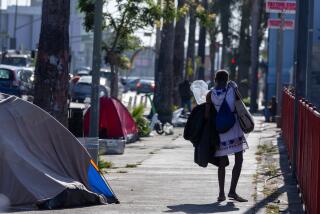ELECTIONS SCHOOL TAX : Prop. B to Decide Financial Help for District : Beverly Hills: The quality of education is at stake, supporters say. Opponents argue for back-to-basics.
Voters on Tuesday will be tested in the Beverly Hills Unified School District--on civics and social responsibility, according to one view, or on economics, according to an opposing view.
On the ballot is Proposition B, a proposal for a parcel tax that would raise about $4.5 million a year for the school district. For the next five years, residential and commercial plots of land in the city would be assessed between $250 to $750 annually depending on their size and use.
The tax must be approved by two-thirds of the voters to take effect.
Proposition B proponents say that the quality of education in the 4,700-student district is at stake. If the measure fails, district officials say, 48 teachers, nurses, counselors and librarians and dozens of teaching assistants will be laid off. Advanced Placement courses and the Academic Decathlon coach will be cut and the high school planetarium will close.
Organized into the Yes on Schools Committee, supporters raised $126,000 for a a campaign with a professional consultant, T-shirts, rallies and the backing of the City Council, several television stars and the teachers union. They have mailed flyers targeted to specific groups.
Renters, for instance, are reminded that under Beverly Hills law, a landlord must prove the tax is an economic hardship before the tax can be passed on to tenants. The board of directors of the Beverly Hills Property Owners Assn. has recommended to its members that the tax not be passed along, said the association’s counsel, Murray Fischer.
Opponents of the tax formed the Beverly Hills Citizens for Cost-Effective Quality Education. They have campaigned on $400 and a platform of tax revolt and back-to-basics in education. They question the district’s budgeting, pointing out that it spends almost $6,000 per student annually, more than any other unified district in Los Angeles County. Districts in other affluent communities, such as San Marino, La Canada and Palos Verdes Peninsula, spend less per pupil, but their students score as well or better on state tests, they say.
Anti-tax leader Sherman Kulick dares the district to implement its list of possible cuts, saying that it offers too many frill courses such as Hebrew, stained glass-making and physical education. “So you’re not going to teach German anymore. Big deal, that went out as a language after Word War II,” he said.
“Before (you) come crying to the taxpayers for money, prove to us you’ve . . . cut out all the waste there is,” he said.
But tax supporters argue that the variety and depth of the curriculum is what draws many residents to Beverly Hills. The measure’s defeat will mean that Beverly Hills will drop from being the “one shining light out there” to “just maintaining like most of the other districts in California,” said Ara Prigian, executive director of Westside Teachers United, a branch of the California Teachers Assn.
State schools Supt. Bill Honig, who has endorsed the parcel tax, said that without it, “that school district can’t maintain the quality of education.”
“All these votes are real tough because you’ve got to get two-thirds,” he said. “It depends on how civic-minded people are. . . . Some of these communities that are really focused on education will do it.”
Defeat in Beverly Hills would also be a damper for other districts, said Bernard Nebenzahl, a chairman of the Yes on Schools committee. “If we, who are presumably concerned citizens in a somewhat sophisticated community, do not support education in the broadest sense . . . it sends a message to other communities . . . that the opportunity (for passing a school tax or bond) in our community is also probably limited.”
Statewide, only 37% of the proposals for school parcel taxes have passed in the last seven years. Among the districts that did succeed are Santa Monica-Malibu and Berkeley and Piedmont in Northern California. Among the failures was Beverly Hills’ last parcel tax attempt in 1987. Then, 59% of the voters approved the tax, short of the two-thirds needed.
Demographics aren’t too rosy for the tax supporters either. Beverly Hills has a large contingent of residents who don’t have children in the schools and are more likely to oppose the school tax. And many of the parents who would favor the tax are recent immigrants not yet eligible to vote. Also ineligible are most of the teachers, who, given the pricey housing in Beverly Hills, live outside the district.
But the bottom line is, “if (voters) see they’re going to benefit, they’ll vote for it, if not, they won’t,” said Duwayne Brooks, assistant superintendent for school facilities planning of the state Department of Education.
Tax opponent Kulick disagrees that education is the issue in the election. “Everybody supports the schools,” he said. “What people oppose is waste in government spending.”
* PRIMARY LINEUP
A brief recap of Tuesday’s primary election in legislative and congressional districts.
More to Read
Sign up for Essential California
The most important California stories and recommendations in your inbox every morning.
You may occasionally receive promotional content from the Los Angeles Times.









